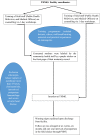Single center experience on implementation of the postpartum intrauterine device (PPIUD) in Sri Lanka: a retrospective study
- PMID: 32276669
- PMCID: PMC7146879
- DOI: 10.1186/s13104-020-05045-x
Single center experience on implementation of the postpartum intrauterine device (PPIUD) in Sri Lanka: a retrospective study
Abstract
Objectives: to study the institutionalization of PPIUD services at Teaching Hospital, Mahamodara, Galle (THMG) and to study the feasibility, challenges and barriers for implementation.
Results: Total of 46,815 deliveries had occurred in the facility during the study period. Out of that 23,117 (49.4%) women had been counseled and 5775 (25.0%) of them were primigravida and 892 (3.9%) were teenage mothers. Total of 14,051 (60.8%) women were interviewed, but only 772 (5.5%) women consented for PPIUD. Consent withdrawal was seen in 29 (3.8%) cases. A total of 409 community health staff were trained for counseling and follow up. PPIUD uptake was 470 (3.4%) which is comparable to national figures. Follow up data at 1 year was available from 199 women and spontaneous expulsion had occurred in eight (6.7%) cases with no cases of perforation or failure in terms of pregnancy. This short report gives the impression that PPIUD can be successfully implemented in resource limited settings and this also provides a feedback for the policy makers to take the necessary actions to improve the uptake of this cost effective, safe PPFP method. A routine PPIUD service has been successfully established within a tertiary care maternity setting in Sri Lanka.
Keywords: Copper; Family planning services; Health plan implementation; Intrauterine devices; Postpartum period.
Conflict of interest statement
The authors declare that they have no competing interests.
Figures
References
-
- World Health Organization . Programming strategies for postpartum family planning. Geneva: World Health Organization; 2013.
-
- Dasanayake DLW, Dilhani DWGI. Knowledge, attitude and practices regarding postpartum contraception among postnatal mothers. Galle Medical Journal. 2018;23(1):1–6. doi: 10.4038/gmj.v23i1.7983. - DOI
Publication types
MeSH terms
LinkOut - more resources
Full Text Sources
Medical


